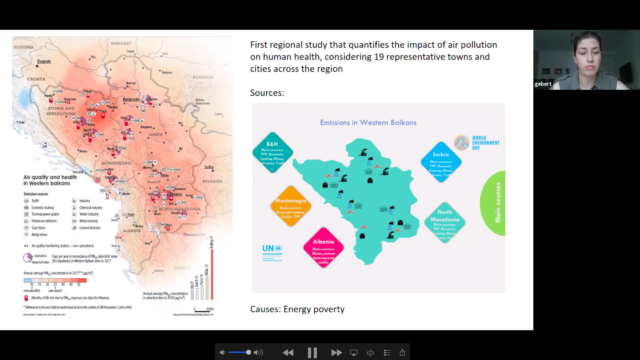Resources

Environment and Health

Rule of Law

Western Balkans forum: environmental / climate achievements and future challenges
Actions to address pollution
Prevention
Minimize and control
Eliminate and Remediate
Prevention actions include:
- Analysis of the regional priorities on pollution prevention and control
- Establishment of thematic clusters with regional and international experts, addressing the regional priorities identified
- Organization of thematic events to exchange experiences and good practices
- Development of dedicated studies, in particular the study on Air pollution in the Western Balkans
Minimize and control actions include:
- Institutional Assessment of the beneficiary partners
- Establishment of a regional network of experts
- Training to strengthen the capacity of the competent bodies in pollution monitoring, prevention, collection and analysis of environmental data
Elimination actions include:
- Development of dedicated technical regulations and guidelines to address and manage the impact of pollution (see in particular the for the remediation of contaminated sites
- Training to support the competent institutions in the implementation of the EU and international standards.
Monitoring and reporting
Monitoring and reporting: why it matters
Environmental policies need to be underpinned by robust scientific evidence. The establishment of a state of environment monitoring and reporting system is essential to inform decision-makers of the consequences of actions and changes in the environment. The result from the monitoring is fundamental to fulfill EU, international and national reporting obligations.
Pollution Monitoring - Meeting for Beneficiary Partners
27 June 2021
The purpose of the event was to present and discuss the results of the assessment performed regarding the hardware and software configurations currently available in each beneficiary institution, the identification of improvements required to assure an adequate operating standard of the envisaged GIS tool, the definition of the procurement process, the installation and activation of the GIS tool as a service for the wider community of stakeholders and potential users.


Western Balkans forum: environmental / climate achievements and future challenges
Environment and Health
The importance of environment and health
Many linkages between the environment and health have been explored during the Southeast European Platform to Beat Pollution project. Pollution is a well-known phenomenon and represents a universal challenge that does not respect national boundaries and contributes to the death of millions of people every year. Pollution also threatens wildlife and plants and can devastate entire ecosystems, having tremendous impacts on human health. Approximately 19 million premature deaths are estimated to occur annually because of the way societies use natural resource and impact the environment to support production and consumption patterns. Of these 19 million, 7 million people die from air pollution. In addition, 80% of global wastewater enters the environment without proper treatment, marine litter is found in 100% of sea turtle species and lead poisoning in children costs the world some 977 billion USD a year. The topic of pollution represents one of the most pressing health issues worldwide, and the 2030 Agenda for Sustainable Development offers, through the SDGs and its pollution reducing targets, a great chance for triggering concrete initiatives to tackle pollution.
UNEP has produced several reports on this topic to provide further context. Check out the 2017 report "Towards a Pollution-Free Planet" or the recent publication on Air Pollution in the Western Balkans.
Summary Report
Webinar on Environment and Health

Environment and Health
Rule of Law
The importance of rule of law in beating pollution
The Rule of law means that all persons, institutions, entities, public and private, including the State are accountable to laws, and that laws are consistent with fundamental rights, inclusively promulgated, and effectively implemented and enforced. In a formal sense, the rule of law requires respect for the separation of powers, the principle of legality, legal certainty, the prohibition of arbitrariness of the executive power in the application of the law, and the effectiveness of judicial protection.
In combination with the Environmental needs/objectives, aiming at protecting environment to support human life and society, as well as life on the planet, it results in the Environmental rule of law
The Environmental rule of law incorporates these components and applies them in the environmental context. As such, environmental rule of law holds all entities equally accountable to publicly promulgated, independently adjudicated laws that are consistent with international norms and standards for sustaining the planet, as such the Environmental rule of law is key to achieving the Sustainable Development Goals.
Environmental rule of creates a foundation for environmental governance that protects rights and enforces fundamental obligations.
Summary Report
Webinar on Rule of Law

Rule of Law
Other Helpful Resources
EU Zero Pollution Stakeholders Platform
Visit the Platform here.
European Circular Economy Stakeholders Platform
Visit the Platform here.
Chemicals Strategy for Sustainability
The members of the high-level roundtable include leaders from Member States, industry, NGOs, international organisations and scientists, who will support the Commission in achieving the objectives of the strategy and monitor its implementation.
See the Strategy here.
UNEP - Urban Air Action Platform
Visit the Platform here.
The Multisectoral Coordination Mechanism Operational Tool (MCM OT)
Visit the Mechanism here.
Regional Cooperation Council
Visit the Council here.
Energy Community
Visit the Community here.
Transport Community
Visit the Community here.
International Commission for the Protection of the Danube River
Visit the Commission here.
International Sava River Basin Commission
•Establishment of an international regime for navigation on the Sava River and its navigable tributaries
•Establishment of sustainable water management
•Undertaking of measures to prevent or limit hazards, to reduce and eliminate adverse consequences including those from floods, ice, droughts and incidents involving substances hazardous for water.
Visit the Commission here.
Land Use/Cover Area frame statistical Survey - LUCAS
Visit the website here.
EU Soil Observatory - EUSO
Visit the Observatory here.
